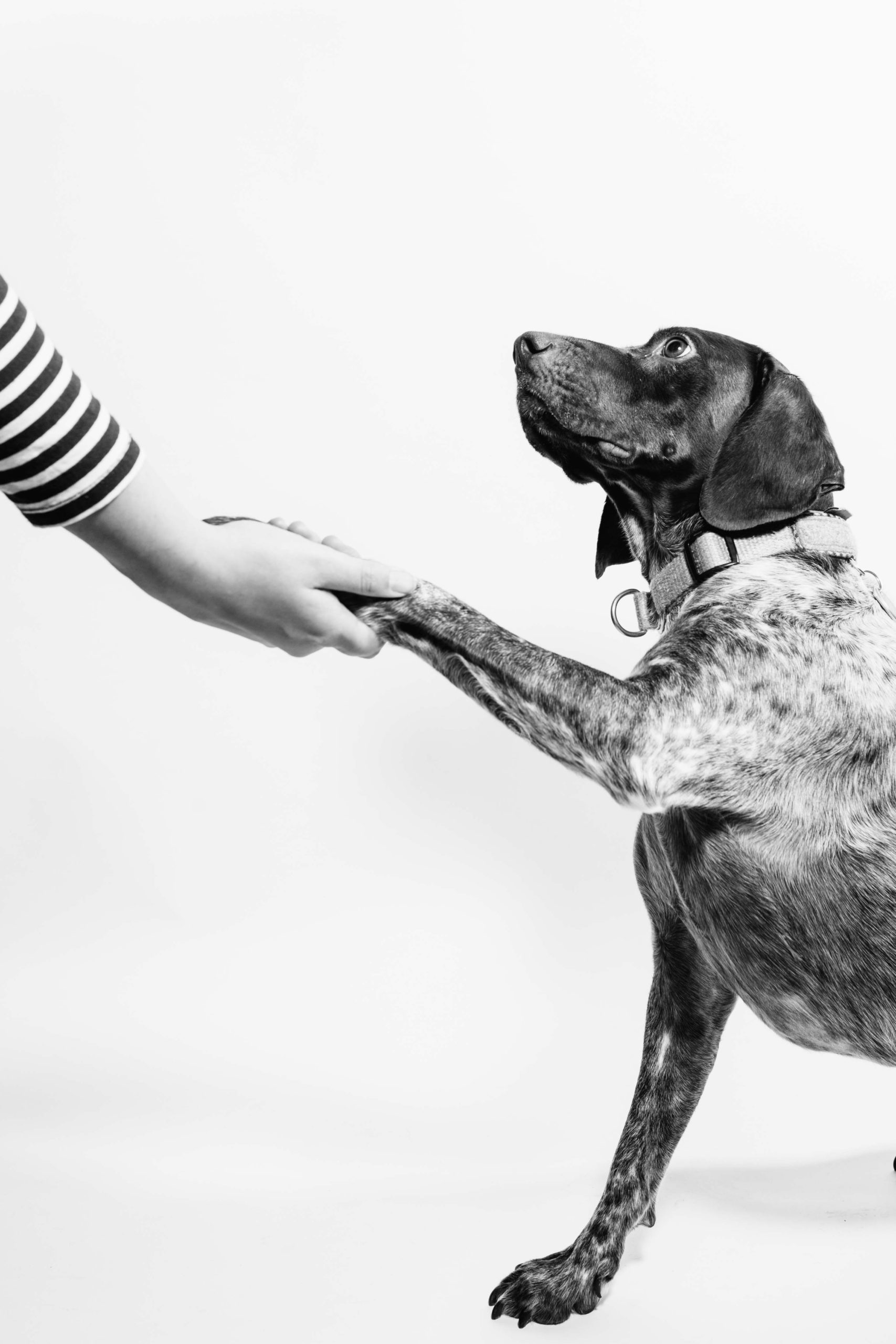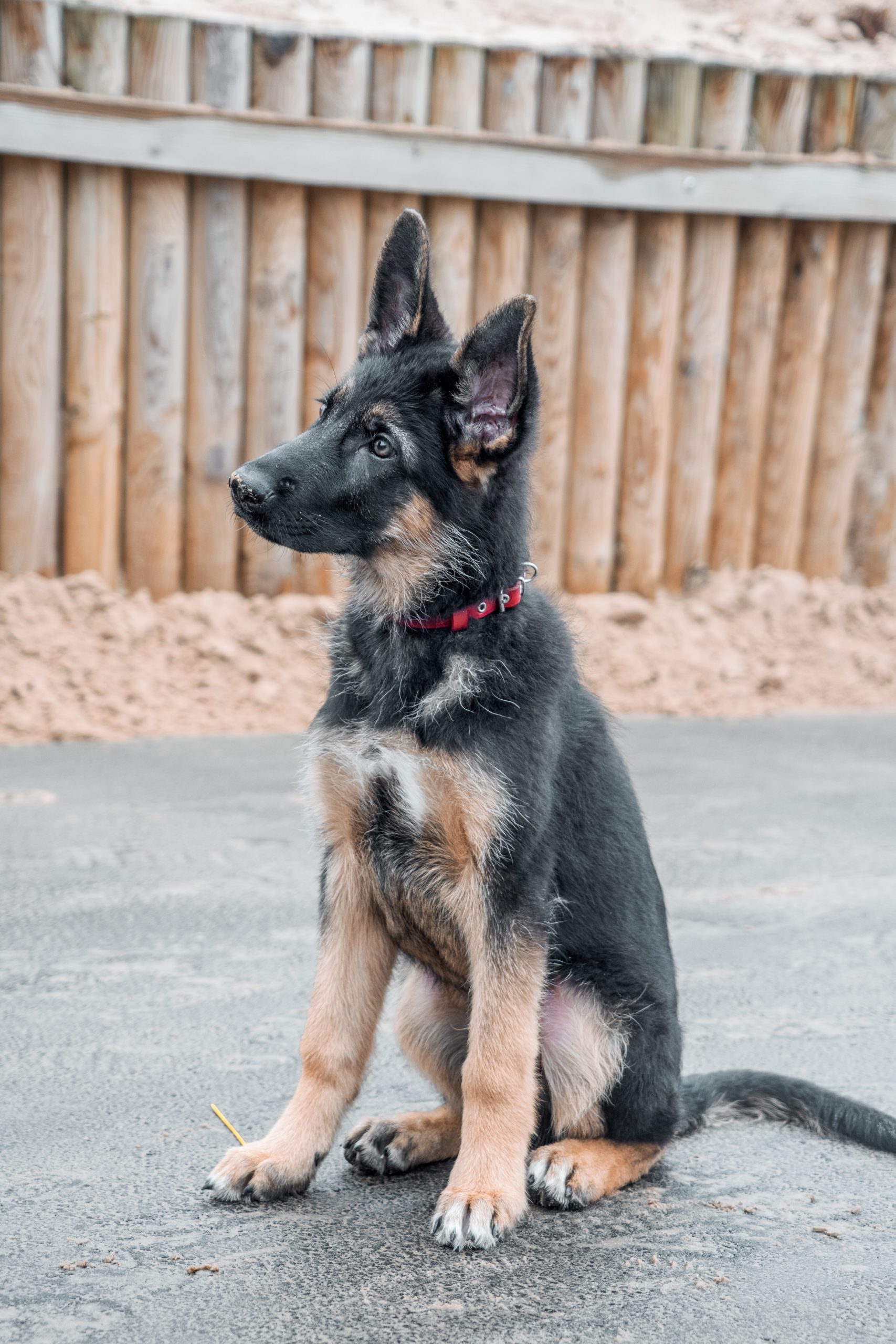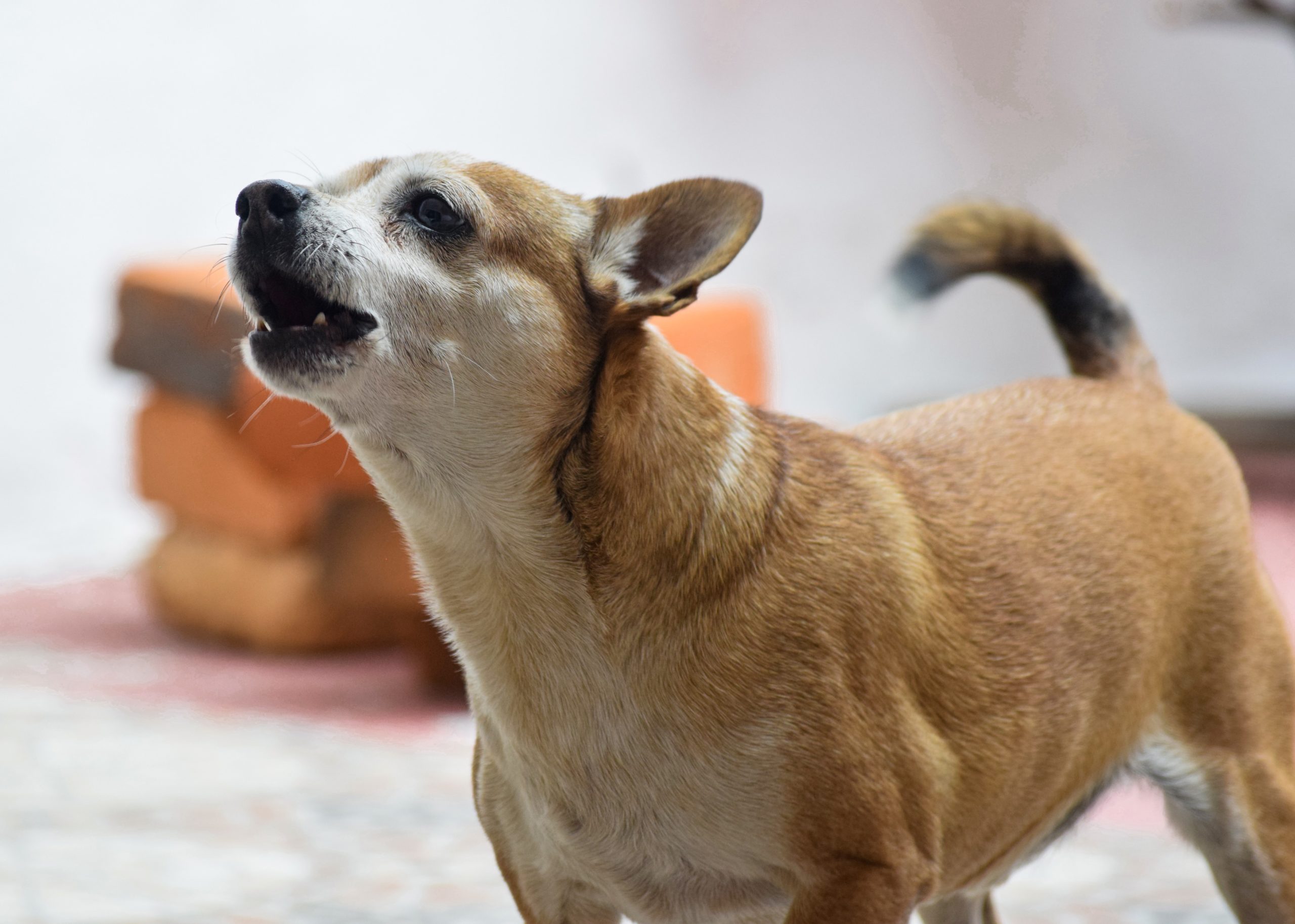Is your new puppy’s incessant barking driving you up the wall? You’re not alone. Nuisance barking is a common issue among young dogs, and it’s important to address this behavior early on before it becomes ingrained in your pet’s daily routine.
In this comprehensive blog post, we will explore the reasons behind puppy barking and share proven techniques for bringing calm and quiet back into your home.
From understanding canine communication to utilizing positive reinforcement training, we’ve got you covered with expert tips and advice designed to help both you and your furry friend live harmoniously together.
Understanding Why Puppies Bark
Puppies bark as a means of communication, attention-seeking, fear or anxiety, territorial behavior, and excitement or playfulness.
Communication
Puppies often use barking as a means of communication to express their needs and emotions. They might bark when they want food, need a potty break, or simply desire some attention from you.
For example, if your puppy consistently whimpers before escalating into louder barking while staring at their water bowl, they are likely trying to signal that they need more water.
By promptly addressing this issue upon noticing it first occurs you can prevent the situation from escalating further. Conversely, if your puppy tends to bark whenever someone new enters the house or passes by outside – seemingly as an alert mechanism – this type of communication is normal canine behavior stemming from an instinctive drive to protect themselves and their family members from potential threats.
Attention Seeking
One common reason why puppies bark is because they want attention. Puppies are naturally social animals and crave interaction with their owners or other dogs.
To discourage this behavior, it’s important to provide your puppy with plenty of playtime and affection throughout the day.
You can also use positive reinforcement training techniques to teach your puppy that quiet behavior results in rewards like treats or extra playtime.
Fear Or Anxiety
Puppies may bark excessively out of fear or anxiety. This can happen when they encounter new people or places, loud noises like thunderstorms or fireworks, or when left alone for long periods.
A fearful puppy may bark to communicate their discomfort and seek comfort from their owner. As a pet owner, it’s important to identify the source of your puppy’s fear and address it through positive reinforcement training techniques such as desensitization and counter-conditioning.
For example, if your puppy barks at loud noises like thunderstorms or fireworks, you could use white noise machines or calming music to create a relaxing environment for them during these events.
Additionally, providing mental stimulation through puzzle toys can help prevent anxiety-related barking by keeping your pup engaged and occupied in a healthy way.
Territorial Behavior
Puppies are naturally territorial, and barking is one way they assert their dominance over space. If your puppy barks excessively whenever someone approaches the door or when other dogs walk by outside, it could be due to territorial behavior.
One way to address this issue is through house training as well as socialization. Introduce your puppy to new people and animals in a controlled environment so that they learn not to view them as threats.
It’s also important to establish boundaries for your puppy early on, such as teaching them where their crate or designated play area is located.
Excitement Or Playfulness
Puppies are naturally exuberant and playful, and this can lead them to bark excessively out of sheer excitement or joy. As a puppy owner, it’s essential to recognize these triggers and provide adequate training to prevent excessive barking.
One effective technique is to redirect their enthusiasm through physical activity like playing fetch or going for walks. Another useful tip is to avoid reinforcing the behavior by responding every time your puppy barks in excitement.
Instead, try calmly and positively redirecting their focus onto something else while using positive reinforcement techniques such as treats or praise when they engage in other activities without barking.
Techniques To Stop A Puppy From Barking
Utilize positive reinforcement training by rewarding your puppy when they exhibit the desired behavior of not barking, and consistently redirecting their attention through toys or treats.
Positive Reinforcement Training
One effective technique for stopping your puppy from barking is positive reinforcement training. This involves rewarding good behavior to encourage the puppy to repeat it. Here are some ways to use positive reinforcement when training your puppy:
- Reward quiet behavior: Praise and treat your puppy when they are not barking, even if it’s just a few seconds of silence.
- Use a clicker: Clicker training involves using a clicking sound to signal good behavior, followed by a reward.
- Treats and toys: Use treats or toys that your puppy loves as rewards for good behavior, such as sitting quietly or responding to commands.
- Consistency: Be consistent with rewards so that your puppy understands what is expected of them.
- Short sessions: Keep training sessions short and fun, so that your puppy doesn’t get bored or frustrated.
By using positive reinforcement training techniques, you can encourage your puppy to learn new behaviors and reduce their barking habits in a gentle and effective way.
Distraction And Redirecting Attention
One technique to stop a puppy from barking is to distract and redirect their attention. Here are some ways to do it:
- Use toys or treats to redirect their focus.
- Provide mental stimulation with puzzle toys or training exercises.
- Teach your puppy new commands to redirect their focus, such as “sit” or “down.”
- Use a white noise machine or calming music to create a distraction.
- Take your puppy for a walk or playtime in a different location away from the trigger of their barking.
- Give your puppy a job to do, such as carrying a toy while walking, to redirect their attention.
By distracting and redirecting your puppy’s attention, they can learn that there are more appropriate ways to communicate and get attention than barking excessively. Remember to reinforce these positive behaviors with treats and praise.
Ensuring Physical And Mental Needs Are Met
One of the main reasons puppies bark is due to boredom or pent-up energy. As a dog owner, it’s important to ensure that your puppy’s physical and mental needs are met so that they don’t resort to excessive barking.
This can include regular exercises such as walks and playtime in the backyard or park.
Additionally, make sure you’re providing your puppy with enough socialization opportunities. Dogs are social animals and need interaction with other dogs and humans to prevent loneliness and anxiety which often leads to destructive behaviors like excessive barking.
Meeting new people or dogs on a daily basis can be helpful in preventing boredom and barking.
Avoiding Reinforcing Barking Behavior
To avoid reinforcing barking behavior, it’s important to understand that any attention given to your barking puppy can be seen as a reward. This means that yelling at them or giving in to their demands will only reinforce the habit of barking for attention.
One effective technique is to provide your puppy with an alternative behavior when they start barking excessively, such as offering them a toy or treat. This not only helps distract them from whatever triggered the excessive barking but also teaches them that good things come from being quiet.
Desensitization
Desensitization is a technique to help reduce your puppy’s barking behavior by slowly getting them used to the stimulus that triggers their barking. Here are some steps you can follow:
- Introduce the trigger: Gradually introduce your puppy to the trigger that sets off their barking. For example, if they bark at the sound of the doorbell, start by ringing it softly and from a distance.
- Reward calm behavior: When your puppy remains calm during the introduction of the trigger, reward them with treats or praise.
- Increase intensity and duration: Slowly increase the intensity and duration of the trigger while rewarding calm behavior. For instance, ring the doorbell louder and closer over time.
- Repeat regularly: Consistency is important for desensitization to be effective. Repeat this process daily until your puppy is comfortable around the trigger without barking excessively.
- Seek professional help if needed: If your puppy shows signs of stress or anxiety during desensitization training, seek professional help from a dog trainer or veterinarian.
By following these steps, you can train your puppy to be less reactive to certain stimuli and reduce its excessive barking behavior over time.
Common Mistakes To Avoid When Training Your Puppy
Avoid punishing your puppy for barking and be consistent with training techniques, as impatience and using the wrong methods can hinder progress in stopping excessive barking behavior.
Punishing Your Puppy
It’s important to avoid punishing your puppy when trying to stop incessant barking. Punishing can include yelling, hitting, or even using shock collars.
Instead of punishment, positive reinforcement techniques should be used. This includes rewarding the puppy for good behavior and ignoring bad behavior rather than giving it attention.
Training should always be done in a patient and consistent manner with love and care for the animal’s well-being.
Overall, it’s clear that positive reinforcement training leads to better results than punishment when trying to stop excessive barking in puppies.
Inconsistency
Another common mistake when training a puppy to stop barking is inconsistency. This can include using different commands or techniques, not enforcing rules consistently, or not following through with consequences for bad behavior.
Inconsistency can confuse your puppy and make it harder for them to understand what you want from them.
To avoid inconsistency, establish clear rules and routines for your puppy and stick to them as much as possible. Use consistent commands and rewards for good behavior so that your puppy learns what is expected of them.
It’s also important to be patient and consistent in training over time rather than expecting immediate results.
Remember that puppies are like children – they thrive on consistency and routine!
Impatience
One common mistake to avoid when training your puppy not to bark is impatience. It’s important to remember that behavior change takes time and consistency.
Expecting immediate results or getting frustrated with slow progress can lead to ineffective training techniques and reinforce bad behavior.
For example, if your puppy continues barking after a few attempts at positive reinforcement, it’s important not to resort to punishment or negative reinforcement.
Consistency is also key in avoiding impatience while training your puppy not to bark. Make sure all family members are on board with the same approach and remain consistent in reinforcing good behavior over an extended period of time.
Using The Wrong Training Techniques
It’s important to use the right training techniques when trying to stop your puppy from barking. Punishing your puppy for barking can actually reinforce the behavior, as they may see it as getting attention or a reaction from you.
Inconsistency in training can also confuse your puppy and make it harder for them to learn what is acceptable behavior.
Using positive reinforcement techniques, such as rewarding good behavior with treats or praise, is an effective way to train your puppy not to bark excessively. Consistently reinforcing these behaviors will help establish good habits and prevent nuisance barking in the future.
It’s important to remember that every dog is different and some puppies may require professional help if their barking is due to anxiety or other behavioral issues.
Specific Strategies For Stopping Puppy Barking
Teaching the “quiet” command, providing plenty of exercise and stimulation, using white noise and visual blockers, and seeking professional help if needed are just a few specific strategies to stop your puppy from barking excessively.
Teach The “quiet” Command
One effective technique to stop a puppy from barking is to teach the “quiet” command. Here are some steps to help you teach your puppy this command:
- Start by getting your puppy excited and barking.
- Hold a treat in front of their nose and say “quiet” in a firm but calm voice.
- As soon as your puppy stops barking, give them the treat and praise them.
- Repeat this process several times a day, gradually increasing the duration between the command and the reward.
- Once your puppy reliably understands the command, start using it in real – life situations where they tend to bark.
- When your puppy starts barking, say “quiet” and wait for them to stop before giving them praise and a treat.
Remember to be patient when teaching this command – it may take some time for your puppy to learn. Additionally, make sure you are consistent with using the same command word each time and avoiding rewarding any unwanted behavior (such as continuing to bark after being told “quiet”).
Use A Consistent Routine
Consistency is key when it comes to training your puppy to stop barking. Dogs thrive on routine and structure, so establishing a consistent daily routine can help them feel secure and reduce their stress levels.
For example, if you notice that your puppy tends to bark excessively in the evenings when they are feeling restless or bored, try incorporating a calming evening routine into their schedule.
By providing your puppy with consistent structure and routines, you can help prevent excessive barking by reducing their anxiety and boredom levels.
Provide Plenty Of Exercise And Stimulation
It’s important to keep your puppy active and stimulated in order to prevent excessive barking. This means providing plenty of opportunities for exercise, play, and mental stimulation throughout the day.
You can take your puppy on walks, play games like fetch or hide-and-seek, or provide puzzle toys that require problem-solving skills. Additionally, socialization with other dogs and people can also help reduce anxiety and prevent barking triggered by fear or territorial behavior.
Use White Noise And Visual Blockers
Another effective technique for stopping your puppy from barking is to use white noise and visual blockers. White noise machines or apps can provide a soothing background sound that helps mask external noises, reducing the need for your puppy to bark in response to them.
For example, if you live on a busy street with lots of foot traffic outside, using a white noise machine near your pup’s bed can help keep them calm and reduce their urge to bark at passersby.
If there are windows in the room where your dog spends time during the day, consider using blackout curtains or other window treatments to block their view of outside distractions.
Seek Professional Help If Needed
If your puppy’s barking is excessive or you’re struggling to control the behavior, it may be time to seek professional help. A certified dog trainer or animal behaviorist can work with you and your puppy to identify the root cause of the barking and develop a personalized training plan.
Working with a professional can be particularly helpful if your puppy has separation anxiety or other underlying behavioral issues that are contributing to their barking.
A trainer or behaviorist can help address these issues while also teaching your puppy new positive behaviors.
Conclusion
Stopping puppy barking requires patience, consistency, and a good understanding of your pup’s behavior. It’s important to remember that punishment and negative reinforcement are not effective long-term solutions.
Positive reinforcement training techniques such as desensitization, redirecting attention, and teaching the “quiet” command can be effective in stopping excessive barking.
Providing physical and mental stimulation through exercise and toys can help reduce stress and anxiety which is often a trigger for barking.
FAQs:
1. Why does my puppy bark excessively and how can I stop it?
Excessive barking in puppies could be due to boredom, separation anxiety or territorial behavior. To stop it, start by identifying the root cause of the barking and then address it through positive reinforcement training techniques.
2. What are some effective training methods to prevent a puppy from barking excessively?
Positive reinforcement training methods such as rewarding good behavior with treats, redirecting attention to toys or activities, using verbal commands like “quiet” or “enough,” and desensitizing your pet to triggers like doorbells or strangers approaching can all help train your puppy not to bark excessively.
3. Can anti-bark collars be used as a solution for excessive barking in puppies?
Anti-bark collars should be avoided for puppies as they may cause fear, pain or other emotional distress which could lead to more undesirable behaviors later on in life.
4. How long does it take for a puppy’s excessive barking problem to improve through training?
The time taken for a puppy’s excessive barking issue to improve will depend on various factors including the individual dog’s personality and temperament, consistency of training efforts and effectiveness of rewards/positive feedback used during the process of teaching new behaviors/commands that discourage unwanted noise levels such as aggressive vocalizations that disturb neighbors or family members at home when they’re trying rest after work hours etc.



